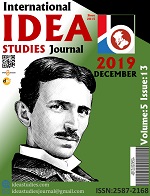ANALYSIS OF THE FOREIGN TRADE ALIGNMENT OF TURKEY AND SOUTH KOREA WITH THE HELP OF TRADE COMPLEMENTARITY INDEX
Author :
Abstract
Turkey and South Korea are two of the leading countries in emerging economies, following the BRICS economies (Brazil, Russia, India, China, South Africa). These two countries increase their share and competitiveness in the world economy with their increasing exports and national incomes. In this perspective, both countries are rapidly evolving as a major competitor against both developing and developed countries. In this study, it is aimed to measure the mutual harmony between the export supply and import demand of the two countries. In other words, the study aimed to determine whether South Korea and Turkey can be good foreign trade partners on a product basis by using the Trade Complementarity Index. For example, if the product pattern in South Korea's exports is consistent with the product pattern in Turkey's imports, it can be stated that Turkey is an important trading partner for South Korea. According to the results, South Korea is not a good partner in Turkey's exports as an importer. As an importer, Turkey is a better partner in South Korea's exports. In other words, the product pattern in Turkey's imports is more consistent with the product pattern in South Korea's exports.
Keywords
Abstract
Turkey and South Korea are two of the leading countries in emerging economies, following the BRICS economies (Brazil, Russia, India, China, South Africa). These two countries increase their share and competitiveness in the world economy with their increasing exports and national incomes. In this perspective, both countries are rapidly evolving as a major competitor against both developing and developed countries. In this study, it is aimed to measure the mutual harmony between the export supply and import demand of the two countries. In other words, the study aimed to determine whether South Korea and Turkey can be good foreign trade partners on a product basis by using the Trade Complementarity Index. For example, if the product pattern in South Korea's exports is consistent with the product pattern in Turkey's imports, it can be stated that Turkey is an important trading partner for South Korea. According to the results, South Korea is not a good partner in Turkey's exports as an importer. As an importer, Turkey is a better partner in South Korea's exports. In other words, the product pattern in Turkey's imports is more consistent with the product pattern in South Korea's exports.
Keywords
- Chandran, S. (2010). Trade Compatibility Between India And Asean Countries. Germany: MPRA
- Chandran, S. (2010). Trade Compatibility Between India And Asean Countries. Germany: MPRA Paper, University Library of Munich.
- Çelen, A., & Demirel, A. (2018). Tamamlayıcılık İndeksi Çalışması: Türkiye Örneği. UİİD-IJEAS, 20, 101-118.
- Çeştepe, H. (2012). Türkiye'nin Seçilmiş Ortadoğu Ülkeleriyle Ticaretinin Analizi. Ekonomik ve Sosyal Araştırmalar Dergisi, 8(2), 23-43.
- Erkan, B., & Bozduman, E. T. (2018). Indıan Economy In Sectoral Specialization And Competitiveness Perspective. The Journal of Academic Social Science, 6(74), 84-99.
- Hoang, V. (2018). Assessing the agricultural trade complementarity of the Association of Southeast Asian Nations countries. Agriculture Economi, 10(64), 464-475.
- https://data.worldbank.org/. (2019, 10 20).
- https://wits.worldbank.org/. (2019, 10 20).
- Ibrahim, K., & Shehu, A. (2016). Nigeria-India Bilateral Trade Relations: An Analysis of Trade Complementarity Index (TCI). Asian Journal of Economic Modelling, 4(4), 190-198.
- Keskingöz, H. (2017). Uluslararası Ekonomik Kuruluşların Türkiye'nin Dış Ticaretine Etkisi. Ankara: Detay Yayıncılık.
- Linnemann, H., & Beers, C. (1988). Measures of Export-Import Similarity, and the Linder Hypothesis Once Again. Review of World Economics, 3(124), 445-457.
- Norak, H., & Kakinaka, M. (2007). Trade Structure and Trade Flows in Cambodia: A Gravity Model. ASEAN Economic Bulletin, 3(24), 305-319.
- Saygılı, R. F., & Terzioğlu, B. (2008). Türkiye’nin AB’ye katılım sürecine ticarette uyumluluk açısından bir bakış. İktisat İşletme ve Finans, 23(263), 124-145.
- Shuai, C., & Wang, X. (2011). Comparative advantages and complementarity of the Sino-US agricultural trade: An empirical analysis. Agriculture Economi, 3(57), 118-131.
- Şimşek, N., Şimşek, H., & Zhanaltay, Z. (2017). Analysis of Bilateral Trade Relations between Turkey and Russia Federation. Bilig(83), 1-26.





